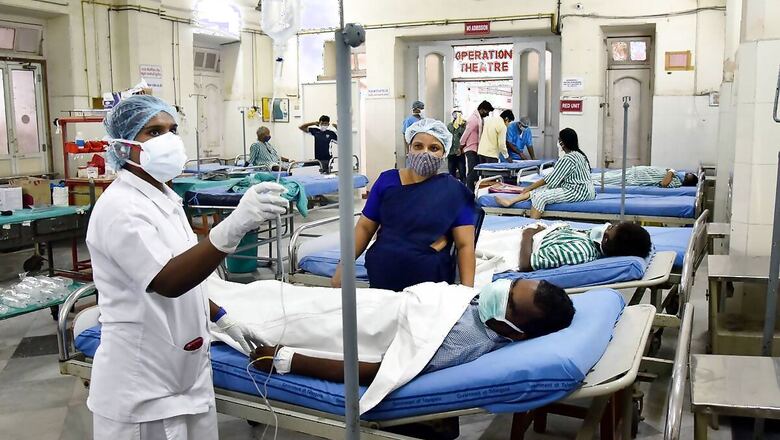
views
Amid the rise in mucormycosis cases across India, a number of doctors have demanded that there should be proper research on the role of zinc supplements in the increase of infection, citing that fungi thrive in zinc-rich environment.
Government data shows that there are 11,717 cases of mucormycosis, also called black fungus, across the country as of Thursday. Till May 24, this number was over 9,000.
To enhance immunity, people have been consuming multivitamins and supplements since the outbreak of the coronavirus infection. The sale of these has increased drastically since the beginning of the Covid-19 pandemic.
In 2020, the sale of Vitamin C doubled when compared to the previous year. A report claims that 185 crore pills of supplements were consumed last year. The report was released by the research wing of AlI India Organisation of Chemists and Druggists (AIOCD), an apex lobby of over 8.5 lakh chemists across India.
The AIOCD-AWACS says that last year chemists across the country sold around 171 crore pills of Vitamin C and 13 crore pills of Vitamin C combined with other multivitamins. Along with Vitamin C, zinc supplements are also commonly being used after the outbreak of the infection.
Also Read: Forced to Clean Fridge Amid Black Fungus Fears? Onions Giving You Nightmares? Common Myths Busted
The sale of Zincovit spiked by 93 per cent with a total of 54 crore tablets sold in 2020. In 2019, 28 crore tablets were sold. Since February 2021, the sale again reported an increase. In March, the sale of vitamin supplements reported over a 22 per cent jump, the firm said.
These supplements are over-the-counter products or non-prescription medicine. They fall under the food supplements category and not drugs, so purchasing these tablets are easy.
The increase in the sale of such supplements has been seen as panic buying. Most of the time when they are not prescribed, it is driven by unproven social media messages saying that the supplements boost immunity and helps in the fight against Covid-19.
A section of experts says that these supplements are needed only for those who are either undernourished or have been recommended.
Several doctors across the country have associated zinc with mucormycosis — a fungal infection being widely reported among patients who were recovered from coronavirus.
They feel that abuse of zinc tablets, also available in multivitamin supplements, can be a reason for the increase in the fungal attack.
While there has been no study in India, doctors claim that high levels of sugar, iron and zinc create a favourable condition for the fungus to grow.
Karnataka-based Dr Vikram Sakleshpur Kumar took to Twitter and said that inadvertent pumping of too much of zinc could also be contributing to this epidemic of mucormycosis along with other risk factors. He also shared a number of old studies to validate his point.
https://twitter.com/vikkypaedia/status/1395999097945948161?s=20
https://twitter.com/vikkypaedia/status/1396035137284935683?s=20
In a series of tweets, Dr Rajeev Jayadevan, a senior consultant Gastroenterologist and former President of Indian Medical Association Cochin, termed antibiotics, zinc, and steaming to be the three potential causes and demanded that their roles should be analysed.
https://twitter.com/RajeevJayadevan/status/1396362360885977090?s=20
https://twitter.com/RajeevJayadevan/status/1396362364883128324?s=20
https://twitter.com/RajeevJayadevan/status/1396362366636281858?s=20
He used an analysis of 210 patients by Dr VP Pandey from Indore’s Mahatma Gandhi Memorial Government Medical College. “210 patients. Antibiotics had been used in 100% patients, steroids not used in 14%, 21% were not diabetic, 36% were at home, oxygen only by 52%, Zinc status not checked,” he said in one of the tweets. He added that there are factors beyond steroid use and diabetes that are responsible for the fungal infection.
Jayadevan said the use of zinc supplements is a risk factor that needs to be investigated.
“Fungi thrive in zinc-rich environment, and mammalian cells try to keep zinc away from fungus to avoid infection,” he added.
The US government agency National Institute of Health (NIH) in its Covid-19 treatment guidelines advised against zinc supplementation above the usual dietary allowance, except in a clinical trial. It said that there are insufficient data for the COVID-19 Treatment Guidelines Panel to recommend either for or against the use of zinc for the treatment of Covid-19.
In addition, a study published in JAMA Network Open in January says that treatment with zinc, ascorbic acid, or both does not affect SARS-CoV-2 symptoms.
In the randomised clinical trial of 214 patients with confirmed SARS-CoV-2 infection receiving outpatient care, there was no significant difference in the duration of symptoms among the groups.
Further, ‘desi’ products claiming to enhance immunity are also gaining market.
Coronil was launched on June 23 as a cure for Covid-19. Even though the product lacked proper clinical trial data, there has been a huge demand for the product. The firm had initially sought permission to sell it as a medicine for cough, fever, and boosting immunity. In just four months of its launch, till October 18, Patanjali Ayurved had sold around 25 lakh Coronil kits, worth Rs 250 crore.
Last year, Yoga Guru Ramdev has said that Patanjali Ayurved was witnessing a demand of around 10 lakh packs daily for Coronil.
Read all the Latest News, Breaking News and Coronavirus News here. Follow us on Facebook, Twitter and Telegram.




















Comments
0 comment